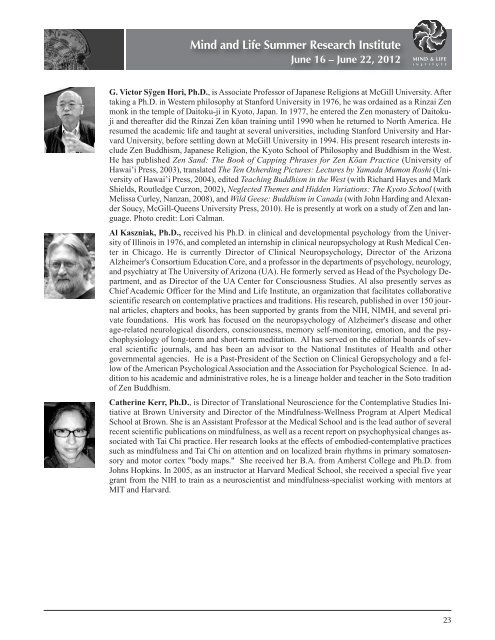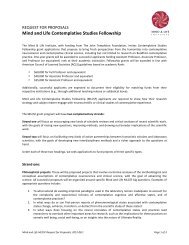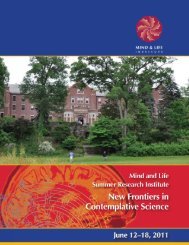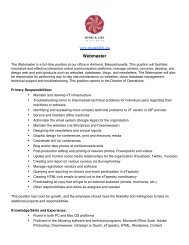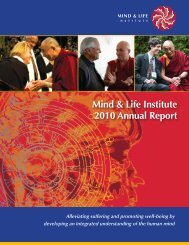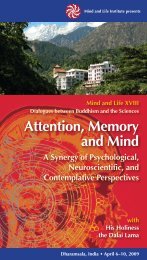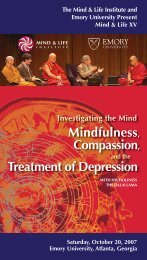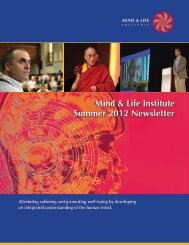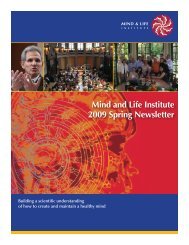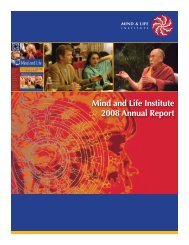CONFERENCE BROCHURE - Mind & Life Institute
CONFERENCE BROCHURE - Mind & Life Institute
CONFERENCE BROCHURE - Mind & Life Institute
You also want an ePaper? Increase the reach of your titles
YUMPU automatically turns print PDFs into web optimized ePapers that Google loves.
<strong>Mind</strong> and <strong>Life</strong> Summer Research <strong>Institute</strong>June 16 – June 22, 2012G. Victor Sÿgen Hori, Ph.D., is Associate Professor of Japanese Religions at McGill University. Aftertaking a Ph.D. in Western philosophy at Stanford University in 1976, he was ordained as a Rinzai Zenmonk in the temple of Daitoku-ji in Kyoto, Japan. In 1977, he entered the Zen monastery of Daitokujiand thereafter did the Rinzai Zen kōan training until 1990 when he returned to North America. Heresumed the academic life and taught at several universities, including Stanford University and HarvardUniversity, before settling down at McGill University in 1994. His present research interests includeZen Buddhism, Japanese Religion, the Kyoto School of Philosophy and Buddhism in the West.He has published Zen Sand: The Book of Capping Phrases for Zen Kōan Practice (University ofHawai’i Press, 2003), translated The Ten Oxherding Pictures: Lectures by Yamada Mumon Roshi (Universityof Hawai’i Press, 2004), edited Teaching Buddhism in the West (with Richard Hayes and MarkShields, Routledge Curzon, 2002), Neglected Themes and Hidden Variations: The Kyoto School (withMelissa Curley, Nanzan, 2008), and Wild Geese: Buddhism in Canada (with John Harding and AlexanderSoucy, McGill-Queens University Press, 2010). He is presently at work on a study of Zen and language.Photo credit: Lori Calman.Al Kaszniak, Ph.D., received his Ph.D. in clinical and developmental psychology from the Universityof Illinois in 1976, and completed an internship in clinical neuropsychology at Rush Medical Centerin Chicago. He is currently Director of Clinical Neuropsychology, Director of the ArizonaAlzheimer's Consortium Education Core, and a professor in the departments of psychology, neurology,and psychiatry at The University of Arizona (UA). He formerly served as Head of the Psychology Department,and as Director of the UA Center for Consciousness Studies. Al also presently serves asChief Academic Officer for the <strong>Mind</strong> and <strong>Life</strong> <strong>Institute</strong>, an organization that facilitates collaborativescientific research on contemplative practices and traditions. His research, published in over 150 journalarticles, chapters and books, has been supported by grants from the NIH, NIMH, and several privatefoundations. His work has focused on the neuropsychology of Alzheimer's disease and otherage-related neurological disorders, consciousness, memory self-monitoring, emotion, and the psychophysiologyof long-term and short-term meditation. Al has served on the editorial boards of severalscientific journals, and has been an advisor to the National <strong>Institute</strong>s of Health and othergovernmental agencies. He is a Past-President of the Section on Clinical Geropsychology and a fellowof the American Psychological Association and the Association for Psychological Science. In additionto his academic and administrative roles, he is a lineage holder and teacher in the Soto traditionof Zen Buddhism.Catherine Kerr, Ph.D., is Director of Translational Neuroscience for the Contemplative Studies Initiativeat Brown University and Director of the <strong>Mind</strong>fulness-Wellness Program at Alpert MedicalSchool at Brown. She is an Assistant Professor at the Medical School and is the lead author of severalrecent scientific publications on mindfulness, as well as a recent report on psychophysical changes associatedwith Tai Chi practice. Her research looks at the effects of embodied-contemplative practicessuch as mindfulness and Tai Chi on attention and on localized brain rhythms in primary somatosensoryand motor cortex "body maps." She received her B.A. from Amherst College and Ph.D. fromJohns Hopkins. In 2005, as an instructor at Harvard Medical School, she received a special five yeargrant from the NIH to train as a neuroscientist and mindfulness-specialist working with mentors atMIT and Harvard.23


